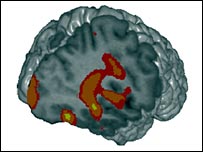 Pedophilia might be the result of faulty connections in the brain, according to new research released by the Centre for Addiction and Mental Health (CAMH). The study used MRIs and a sophisticated computer analysis technique to compare a group of pedophiles with a group of non-sexual criminals. The pedophiles had significantly less of a substance called “white matter.” which  is responsible for wiring the different parts of the brain together. [continue reading…]
Pedophilia might be the result of faulty connections in the brain, according to new research released by the Centre for Addiction and Mental Health (CAMH). The study used MRIs and a sophisticated computer analysis technique to compare a group of pedophiles with a group of non-sexual criminals. The pedophiles had significantly less of a substance called “white matter.” which  is responsible for wiring the different parts of the brain together. [continue reading…]
November 2007
You might think that a long vacation is the way to beat job burnout. But the kind of vacation you have is just as important – if not more important – than its length, concludes Prof. Dov Eden, an organizational psychologist from Tel Aviv University’s Faculty of Management. [continue reading…]
New research shows that how people view their abilities in the workplace impacts how they respond to success.
Dr. Jason Plaks, a social psychologist at the University of Toronto, and Kristin Stecher, a research scientist at the University of Washington, found that those who thought of their capabilities as fixed were more likely to become anxious and disoriented when faced with dramatic success, causing their subsequent performance to plummet, compared to those who thought of their abilities as changeable. [continue reading…]
Researchers at the University of Bath, UK, interviewed 281 male and female undergraduates and got half to imagine a physically unattractive version of themselves they feared they might turn into.
They then asked this group to either imagine a scenario in which they dramatically failed to keep to a fitness programme or one in which they dramatically succeeded.
The researchers found that those who had been asked to think about a dramatic failure to keep to the programme were motivated to keep on training because they were fearful of not looking good. [continue reading…]
